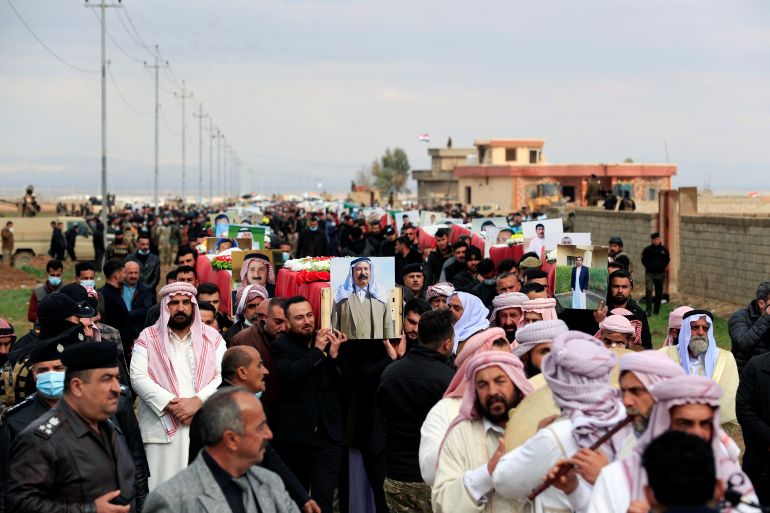Iraq’s reparations law for Yazidi survivors is a positive step
But the government must heed the advice of civil society to make sure it is implemented properly.

When I first spoke with Sahir last year, he was living in a camp for displaced people in northern Iraq.
He told me how, at just 15 years old, he was abducted by ISIL from his family in Iraq. After enduring months of military training and countless hours of propaganda, ISIL forced him to fight in Syria, where he suffered extensive injuries. He was sent to a hospital to recover, and from there he finally managed to escape ISIL.
But nearly three years after returning to Iraq, he is still feeling despondent. Like so many of the estimated 2,000 Yazidi child survivors of ISIL captivity, whose situation Amnesty International documented last year, he had not received any assistance since his return.
“What I was looking for is just someone to care about me, some support,” he said. “Someone to put their hands on my shoulders and say everything will be OK.”
When I spoke with him again recently, he told me he is still stuck in the camp: still waiting, still struggling, and still receiving no support.
Yet the potential for change looms on the horizon for survivors like Sahir.
On March 1, 2021, the Iraqi parliament passed the Yazidi Survivors Law, which provides a reparations framework for survivors of ISIL crimes. Those eligible include, among others, women and girls who were subjected to sexual violence, as well as child survivors who were abducted before the age of 18.
Although the law is targeted at the Yazidi community, it includes in its scope survivors from the Christian, Turkmen, and Shabak minority groups as well. The law provides for, among other assistance, a monthly salary, a plot of land or housing unit, support to re-enter school, and access to psychosocial and other health services.
Regrettably, the Survivors Law has a significant omission: it fails to address the needs of children born as a result of sexual violence by ISIL members, or the needs of their mothers. Although some Yazidi women chose to separate from children born of sexual violence, we found that many others have been forcibly separated – and are desperate to be reunited.
The Iraqi authorities must address the plight of these women and children by specifically including children born of sexual violence in reparations and taking all necessary actions to ensure these women and children can live together in safety.
However, the passage of the Survivors Law is still a remarkable achievement. With its holistic and comprehensive package of reparation measures, it has the potential to become the gold standard for future reparation schemes, setting an example for other governments in how to honour their obligations to survivors.
To achieve that, though, the law must be transformed from words into reality.
In recent weeks, Amnesty International consulted with civil society actors in Iraq, including SEED Foundation, Yazda, Free Yazidi Foundation, and the Coalition for Just Reparations (C4JR), an alliance of 31 Iraqi non-governmental organisations. It was the tireless advocacy of these organisations and other civil society actors and survivors that led to the passage of the law.
If the law is to reach its potential, the Council of Ministers tasked with drafting its implementing regulations should heed these groups’ advice. While their recommendations are extensive and detailed, three are particularly crucial.
First, the implementation of the law must be “survivor-centred”. All those supporting the delivery of services must respect survivors’ confidentiality and privacy, fully inform them of their rights, seek their informed consent, and encourage them to provide feedback on the process.
Second, the application process to receive support from the government must avoid re-traumatising survivors. Eligibility for assistance and support should not rely on any further invasive methods of investigation, or require mandatory disclosure of sexual violence and other crimes. Where possible, survivors’ testimonies should be corroborated by the extensive documentation that has already been gathered in Iraq.
Finally, the application must be accessible to all eligible survivors. They should have the option to submit their applications in person, online, or with the assistance of a third party or organisation. As the Iraqi mission of the International Organization for Migration recently argued, the many survivors based outside Iraq should also have access and be encouraged to apply for reparations under the law.
According to Sahir, the way in which the Survivors Law is implemented – and indeed whether it is implemented at all – represents something of a final test in the eyes of the Yazidi community.
“It is difficult for Yazidis to trust the government again,” he explained. “Until now, they have not done anything for our people. They came with this law now, but we do not know if they will follow through. Now, it is their chance.”
The views expressed in this article are the author’s own and do not necessarily reflect Al Jazeera’s editorial stance.
